2025-11-01 Sat
■ #6032. なぜ英語を学ばなければならないの? --- 中高生に向けて [hel_education][voicy][heldio][elt][notice]
中高生に向けて英語と英語史について話すセミナーがあり,何をどう語ろうかと考えていました.2年半ほど前の2023年5月30日に Voicy heldio で「#729. なぜ英語を学ばなければならないの? --- 中学生のための英語史」と題する回を配信し,反響が大きかったことを思い出したので,そのときの内容を,さらにかみ砕いて話したらどうだろうかと思いつきました.そのためにも一度その概要を(自分のために)文章化しておこうということで,以下の文章となりました.議論の順番を多少組み替えたり,2025年時点での生成AIの発展などを意識して議論に組み込んだりしてありますが,主張したいことは変わっていません.
小中高で英語を学んでいる生徒たちや,ビジネスの現場で奮闘する大人たちまで,多くの日本人が抱く共通の疑問があります.それは「なぜ英語を学ばなければならないの?」という純粋な問いです.
特に生成AIによる翻訳・通訳の技術が目覚ましい進化を遂げ,瞬時に,そしてかなり正確に言語の壁を取り払ってくれるようになった現代において,この問いはかつてないほど切実な重みを増しています.膨大な時間とエネルギーを投じる語学学習は,はたして「コスパが悪い」と言わざるを得ないのだろうか,と.
長らく英語史という分野を専攻してきた研究者の視点から,この疑問に対し,絶対的な「答え」ではなく,中高生の皆さんが自ら考えるための3つの「英語史・言語学的ヒント」を提供したいと思います.
1.英語の世界的な地位は「たまたま」である --- 400年前はわずか600万人の言語
まず,英語の世界語としての地位を相対化する必要があります.今でこそ,英語は世界最強の lingua_franca と見なされていますが,この地位は,英語が言語として本質的に優れていたから得られたものではありません.単に,歴史的な「たまたま」の結果です.驚くべきことに,今から400年ほど前の近代英語期,すなわちシェイクスピアが活躍していた頃の英語話者は,イングランドの人口とほぼ同じ,わずか600万人程度でした.これが,後のイギリス帝国による世界的な植民地拡大と,その後のアメリカ合衆国の台頭という,一連の出来事によって,今日の20億人規模へと爆発的に増加したのです.
この歴史的事実は,英語が絶対不変の覇権言語ではないことを示唆しています.将来,中国語やスペイン語,あるいは今ではまだ目立っていない言語が,この地位を脅かすことは十分にあり得ます.英語学習を考える際,まずはその地位が歴史上の偶然の産物であるという冷静な視点をもつことが大事です.
2.世界「4分の1」のリアル --- 万能ではないが,人類史上最大の言語
では,現在の英語の実力はどのくらいなのでしょうか.「英語ができれば世界中の人と話せる」という言説は,残念ながら過大な期待を含んでいます.現在の世界人口約80億人のうち,母語話者と非母語話者を含め英語でコミュニケーションが取れる人は,せいぜい約20億人.つまり,世界の4分の1ほどにすぎません.私自身,学生時代に世界を旅し,観光地から一歩離れると英語が全く通じないという現実には何度となく直面しました.今でも英語は決して万能ではありません.
しかし,この4分の1という割合は,人類史上,単一の言語が達成した最も高いシェアであることは間違いありません.ギリシア語,ラテン語,アラビア語,中国語など,歴史上「世界語」と呼ばれ得る立場にあった他の言語と比較しても,現代世界における英語の通用度は群を抜いています.
過大評価も過小評価もせず,この「80億分の20億」というリアルな実力を知ること.そして,1つの外国語を選ぶとすれば,史上最大のリーチを持つ英語こそが,最大限の実益を伴う選択肢であることもまた事実なのです.
3.英語(外国語)学習から得られる「発想の転換」
生成AIによる言語技術が発達した現代,労力に見合う英語学習の真の価値はどこにあるのでしょうか.それは,コミュニケーションの便にあるというよりも,むしろ私たちの思考生活を豊かにしてくれる点にあるのではないでしょうか.英語を学ぶことは,私たちが普段,無意識のうちに縛られている日本語の「思考の枠組み」から一時的に解放される機会を与えてくれます.
例えば,日本語では親族を「兄,弟,姉,妹」と年齢の上下関係で厳密に区別するのに対し,英語では brother, sister と性別でしか区別しません.また,日本語では「米,稲,ご飯」などと状況に応じて語彙を使い分けるものを,英語では基本的に rice 一語で表現します.こうした言葉の構造的な違いに触れるとき,「なぜ?」という驚きやショックが生じます.この驚きこそが,日本語という非常に強い束縛から抜け出し,もう1つの視点,つまり英語的な思考法を手に入れるということに他なりません.これは単なる翻訳知識では得られない,世界認識の転換です.
日本語と英語は構造的に非常に隔たりが大きい言語です.だからこそ,発想の転換の恩恵を最大限に受けることができるのです.日本語母語話者にとって,状況はむしろ「ラッキー」であると言えます.得られる知的な恩恵の大きさを考えれば,英語学習のコスパは決して悪くありません.
4. 答えは,あなた自身の中に
英語を学ぶべきか否か.その答えは,大人や先生や大人が与える単純なものではなく,学習者1人ひとりが自らの価値観と目標に基づき,主体的に見つけ出す必要があります.歴史的偶然性,リアルな通用度,そして思考を転換する力.これらの多角的な視点から英語と向き合い,中高生の皆さん自身が答えを見つけてください.最後に,この問いを投げかけたいと思います.生成AIが言葉の壁を取り払うかもしれない未来に向けて,あなたはなぜ,あるいは何を求めて英語(やその他の外国語)を学びますか?
関連して,中高生に向けた heldio 配信回として,以下もお聴きください.
・ 「#510. 中高生に向けて モヤり続けることが何よりも大事です」(2022年10月23日)
・ 「#633. 答えを出すより問いを立てよ」(2023年2月23日)
・ 「#1577. helwa メンバー発信!中高生のあなたへ,私は今こうやって英語(外国語)とつきあっています --- 「英語史ライヴ2025」より」
2025-10-28 Tue
■ #6028. hel活の新たな基地が完成 --- ポータルサイト「The HEL Hub」 [helhub][helkatsu][notice][hel_education][hellog]

ここ数日,集中的に取り組んでいたことが一段落し,hellog 読者の皆さんにご報告できる運びとなりました.私の英語史を広める諸々の活動,すなわち「hel活」 (helkatsu) のポータルサイトとして構想していた「The HEL Hub」がおおよそ完成し,先日ウェブ上で公開されました.
これまでのhel活の「基地」といえば,今お読みいただいている「hellog~英語史ブログ」がその役割を果たしていました.16年半ほど毎日更新し,英語史関連の情報を発信してきました.その hellog から派生した音声ヴァージョンが毎日更新の Voicy 「英語の語源が身につくラジオ (heldio)」で,こちらもおかげさまで4年と5ヶ月ほど継続しています.この2つの媒体が,私の日々のhel活の両輪となっています.
しかし,昨今,私の発信のプラットフォームやメディアが多様化してきており,hellog と heldio に加えて,heldio のプレミアムリスナー限定配信チャンネル「英語史の輪 (helwa)」(有料チャンネル),YouTube 「heltube --- 英語史チャンネル」での heldio 再放送,同僚の井上逸兵さんとともに週2回お届けしている YouTube 「いのほた言語学チャンネル」,そして X(旧 Twitter),Instagram,知識共有サービス Mond といった各種のSNS媒体,さらには講演,インタビュー,雑誌記事,書籍に至るまで,種類も量も随分と増えてきました(おかげさまです).読者やリスナーの皆さんが,これらの英語史コンテンツに容易にアクセスできるように,また私自身にとっても情報発信の整理という意味合いもあり,新たなhel活の基地を作りたいという希望をずっと抱いていました.
そこで今回,突貫工事的な集中作業を経て作ったのが The HEL Hub です.お察しの通り,ここにも私の活動のキーワードである HEL (= History of the English Language)が組み込まれています.英語史をめぐるあらゆる活動の「ハブ」となれば,という願いを込めての名付けです.
この「ヘルハブ」 (helhub) は,今のところトップページ1枚のみの構成です.このシンプルなページから,上に挙げたすべてのhel活の新着コンテンツや新着情報にアクセスすることができます.ページを訪れていただければお分かりになるかと思いますが,helhub はhel活関連情報の最新の「フロー」を重視した作りになっています.「お知らせ」「新着コンテンツ」「hel活メディア一覧」の各セクションでは,生成AIの助けを借りて半自動化されたシステムにより,数時間おきに更新がなされ,常に最新の情報が流れるようになっています.
一方,これまでのようにhel活情報を「ストック」として記録していく役割は,引き続き hellog が担っていくことになります.様々な媒体からの英語史コンテンツのなかでも特に重要な話題は,hellog 記事としても公開・記録し,これまで通りにストック情報を充実させていく方針に変わりはありません.
つまり,日々の最新情報をざっと確認したいという場合には helhub へ,じっくりと英語史の話題を掘り下げたい場合には hellog を訪れていただければと思います.ぜひ hellog とともに helhub も,皆さんの「お気に入り」に登録していただければ幸いです.今後 helhub が皆さんにとって有益な存在となるよう,機能改善や発信方法の工夫などに努めていきます.ぜひ The HEL Hub をよろしくお願いします!
2025-10-27 Mon
■ #6027. lacolaco さん×NotebookLM による英語語源クイズに唸る [heldio][helwa][helmate][helkatsu][kdee][ai][notebooklm][hel_education][etymology][notice][helquiz][kenkyusha]

heldio/helwa のコアリスナー lacolaco さんが,1年9ヶ月ほど前に始められた「英語語源辞典通読ノート」を順調に継続されています.この試みは開始当初に hel活 (helkatsu) 界隈で話題を呼びました.lacolaco さんの挑戦に焚き付けられて,英語史関連の各種辞典を「通読」するシリーズを始められたり,定期的な発信を開始される方々が複数現われてきたのです.
その火付け役の lacolaco さんが,昨日,レギュラーシリーズとしての最新回となる「英語語源辞典通読ノート C (cuckoo-cynical)」を公開され,ついに C の項目をコンプリートされました.おめでとうございます! 一昨日開かれた helwa 北千住オフ会(私はリモートで参加)で,lacolaco さんより記事公開に先立って C 完走の報告を受けたため,皆でお祝いと労いと励ましの言葉を掛けました.
そして,lacolaco さんは,ご自身の C コンプリートの機会に,驚くべき企画を打ち出されました.これまでの記事を Google NotebookLM に読み込ませ,「KDEE通読ノートまとめ-C」と題して,それを「語源クイズ」に仕立て上げてしまったのです.学術的な知識を生成AIという最新のツールに渡し,遊び心に満ちたコンテンツに変える.これは,まさに現代におけるhel活の新しい形を示す,素晴らしい試みです(NotebookLM を利用した別の試みについては,「#5850. 英語語彙史概論の講義内容を NotebookLM でポッドキャスト対談に仕立て上げました」 ([2025-05-03-1]) を参照).
私も早速この C の項目をめぐる語源クイズに挑戦してみましたが,出題の妙に唸らされました.4択問題で出題されるのですが,難易度はかなり高めです.34問中22点,正解率は65%という結果です.中には当てずっぽうで正解したものもあったので,私の実力はもっと低かったということになります.英語史研究者や英語語源愛好家を標榜している者としては,心もとない点数でしたが,1つひとつの問いがたいへん勉強になりました.出題ソースが『英語語源辞典』(研究社)に基づいているので,安心して遊び,学ぶことができます.
このクイズは,単に語源の知識を問うだけでなく,知的好奇心をも刺激してくれます.生成AIが,遊びにも学びにも,これほどまでに有効活用できるとは思いもよりませんでした.現代ならでは語源の楽しみ方ですね.
lacolaco さんのアイディアそのものが秀逸なのですが,それ以前に「英語語源辞典通読ノート」の継続という「仕込み」があったからこそ可能になった試みである点が重要だと考えています.もちろん A と B の項目に関するクイズもすでに作られていますので,lacolaco さんの特別記事「英語語源辞典通読ノートまとめ NotebookLM」経由で訪れていただければ.
lacolaco さん,改めて C の項目の完走,おめでとうございます.そして,今後 D の項目に入っていくとのことですが,引き続き応援いたします!
・ 寺澤 芳雄(編集主幹) 『英語語源辞典』新装版 研究社,2024年.
2025-10-21 Tue
■ #6021. 10月25日(土),朝カル講座の秋期クール第1回「I --- 1人称単数代名詞をめぐる物語」が開講されます [asacul][notice][personal_pronoun][person][case][indo-european][kdee][hee][etymology][sound_change][gvs][spelling][hel_education][helkatsu]
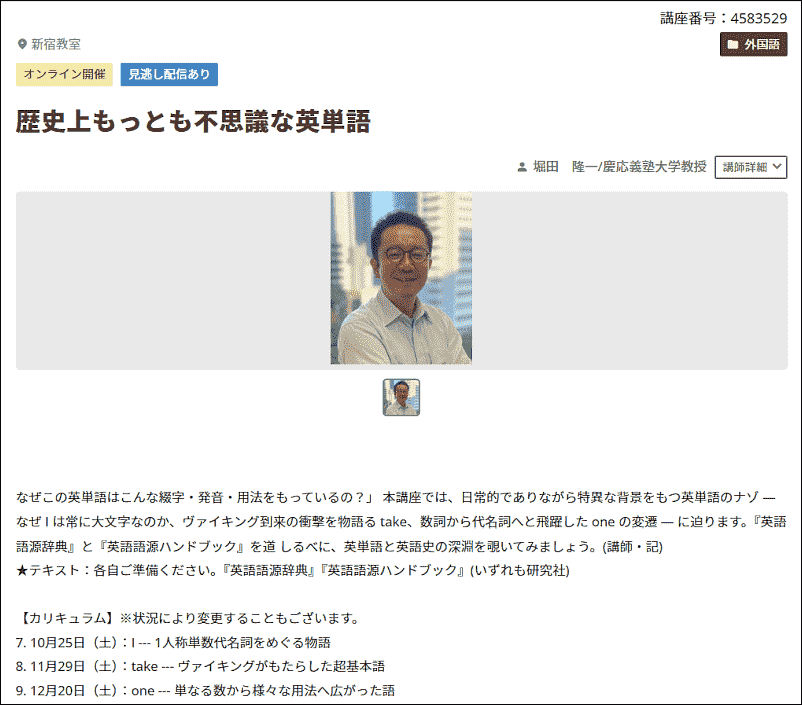
月1回,朝日カルチャーセンター新宿教室で英語史講座を開いています.今年度のシリーズは「歴史上もっとも不思議な英単語」です.英語史的に厚みと含蓄のある英単語を1つ選び,そこから説き起こして,『英語語源辞典』(研究社)や『英語語源ハンドブック』(研究社)等の参考図書の記述を参照しながら,その英単語の歴史,ひいては英語全体の歴史を語ります.
来週末の10月25日(土)の講座は秋期クールの初回となります.今回は,英語において,最も短く身近な単語の1つでありながら,その歴史に壮大な物語を秘めた1人称単数代名詞 I に注目します.誰もが当たり前のように使っているこの単語ですが,少し立ち止まって考えてみると,実に多くの謎に満ちていることに気づかされます.以下,I について思いついた謎をいくつか挙げてみます.
・ 古英語では ic 「イッチ」と発音されていました.これが,いかにして現代の「アイ」という発音に変化したのでしょうか.そもそも語末にあった c の子音はどこへ消えてしまったのでしょう.
・ なぜ I は,文中でも常に大文字で書かれるのでしょうか.
・ なぜ主語は I なのに,目的語にはまったく形の異なる me を用いるのでしょうか.
・ It's me. と It's I. は,どちらが「正しい」のでしょうか.規範文法と実用の観点から考えてみたいと思います.
・ 近年耳にすることも増えた between you and I という表現は文法的にどう説明できるのでしょうか.
・ 翻って日本語には「私」「僕」「俺」など,なぜこれほど多くの1人称代名詞があるのでしょう.英語の歴史と比較することで見えてくるものがありそうです.
このように,たった1文字の単語 I の背後には,音声変化,綴字の慣習,文法規則の変遷,そして語用論的な使い分けといった,英語史u上の重要テーマが凝縮されています.講座では,時間の許す限りなるべく多くの謎に迫っていきたいと思います.
講座への参加方法は,今期よりオンライン参加のみとなります.リアルタイムでの受講のほか,2週間の見逃し配信サービスもあります.皆さんのご都合のよい方法でご参加いただければ幸いです.また,開講時間がこれまでと異なり 15:30--17:00 となっていますので,ご注意ください.講座と申込みの詳細は朝カルの公式ページよりご確認ください.
今度の講座のご紹介は,先日の heldio でも「#1602. 10月25日の朝カル講座は I --- 1人称単数代名詞に注目」としてお話ししましたので,そちらもお聴きください.
なお,秋期クールのラインナップは以下の通りです.皆さんで「英語史の秋」を楽しみましょう!
- 第7回:10月25日(土) 15:30?17:00 「I --- 1人称単数代名詞をめぐる物語」
- 第8回:11月29日(土) 15:30?17:00 「take --- ヴァイキングがもたらした超基本語」
- 第9回:12月20日(土) 15:30?17:00 「one --- 単なる数から様々な用法へ広がった語」
・ 寺澤 芳雄(編集主幹) 『英語語源辞典』新装版 研究社,2024年.
・ 唐澤 一友・小塚 良孝・堀田 隆一(著),福田 一貴・小河 舜(校閲協力) 『英語語源ハンドブック』 研究社,2025年.
2025-10-18 Sat
■ #6018. 『英語語源ハンドブック』への Amazon レビューに感謝 [notice][hee][hel_education][helkatsu]

目下3日前に刊行されたばかりの「いのほたなぜ」の広報に余念がないところではありますが,忘れてはならないのが4ヶ月ほど前に刊行された,こちらもまだ新刊書といってよい『英語語源ハンドブック』です.後者は,おかげさまで再重版がかかっております.
『英語語源ハンドブック』の刊行後,読者の皆さんから多くの声が寄せられてきました.今回はとりわけAmazon レビューに集まった本書に関するご意見やご感想を要約したり部分引用しつつ,ご紹介します.
まず,多くのレビューで共通して言及されているのは,本書が「専門的な信頼性」と「一般読者向けの分かりやすさ」を両立させているという点です.「専門用語は抑制され,見出しや語系図も整理されているので,辞書を渉猟する楽しさと物語を追うワクワク感が両立します」という,まさに私たちが目指した点を的確に表現したお言葉をいただきました.また,「本書は単にトリビア的に語源を紹介する本ではない.英語史という体系的学問に裏打ちされた本である」との評もいただきました.こうしたご感想は,共著者一同にとって何よりの励みとなります.
特に英語教育に携わる先生方からの反響は,予想以上に大きいものでした.本書を「英語教師にとっての「虎の巻」」と呼んでいただいたのは大変光栄です.また,あるレビューアーは,現場で生徒から投げかけられるであろう鋭い問いを挙げ,「ここに本物の答えがあります.ここから本物の問いが始まります」と力強く書いてくださいました.本書が教室での知的な対話のきっかけとなっている様子が目に浮かぶようで,大変嬉しく思います.学生向けの簡約版を望む声も上がっていました.
英語を学び直している社会人の方や,純粋な知的好奇心から手に取ってくださった方からのレビューも,私たちの心を温めてくれました.40年間英語とは無縁だったという方は「学校では習ったことのない英語の歴史,英単語の歴史が書かれており,楽しく読んでいます」「英語に対する好感度が爆上がりするかも?」と書いてくださり,胸が熱くなりました.また,「あなたの努力と振り払ってきた理不尽の伏線回収の時が来た!」という熱いエールも,心に響きました.
一方で,「選んだ単語が基本的過ぎ」るや「どうして rob がないの?」といったご意見もいただきました.JACET8000 の基本1000語に絞るという方針は,ありふれた単語の奥深さを味わっていただきたいという意図によるものでした.1000語という限られた枠のなかで,すべての読者の期待に100%お応えするのは難しいことですが,いただいたご意見は確かに受け取りました.
皆さんからのこうした反響を通じて,本書が私たちの手を離れ,読者一人ひとりのものとして成長していることを実感しています.改めて,温かいレビューをお寄せくださったすべての皆様に,心より御礼申し上げます.引き続き,『英語語源ハンドブック』をご愛読いただけますと幸いです.
・ 唐澤 一友・小塚 良孝・堀田 隆一(著),福田 一貴・小河 舜(校閲協力) 『英語語源ハンドブック』 研究社,2025年.
2025-10-13 Mon
■ #6013. 2025年度の朝カルシリーズ講座の第6回「English --- 慣れ親しんだ単語をどこまでも深掘りする」をマインドマップ化してみました [asacul][mindmap][notice][kdee][hee][etymology][hel_education][link][sound_change][spelling_pronunciation_gap][anglo-saxon][jute][history][germanic][oe][world_englishes][demonym][suffix][onomastics]
9月27日(土)に,今年度の朝日カルチャーセンターのシリーズ講座「歴史上もっとも不思議な英単語」の第6回(夏期クールとしては第3回)が新宿教室にて開講されました.テーマは「English --- 慣れ親しんだ単語をどこまでも深掘りする」です.あまりに馴染み深い単語ですが,これだけで90分語ることができるほど豊かなトピックです.
講座と関連して,事前に Voicy heldio にて「#1574. "English" という英単語について思いをめぐらせたことはありますか? --- 9月27日の朝カル講座」を配信しました.
この第6回講座の内容を markmap によりマインドマップ化して整理しました(画像をクリックして拡大).復習用にご参照いただければ.
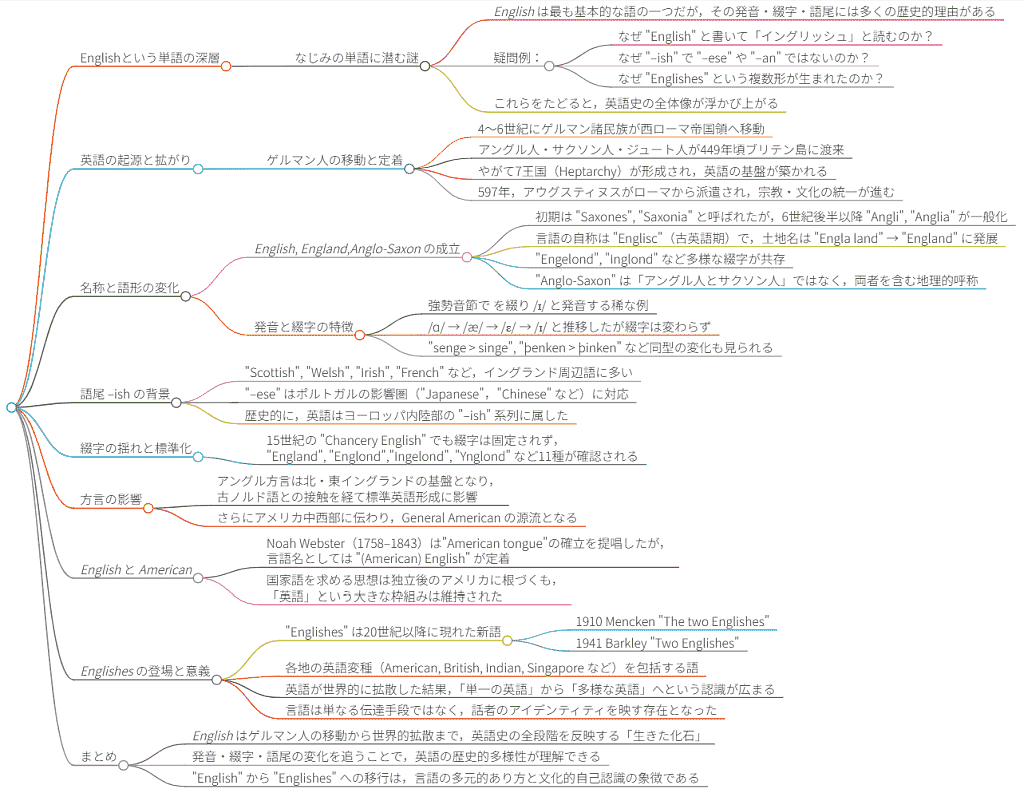
なお,この朝カル講座のシリーズの第1回から第4回についてもマインドマップを作成しています.
・ 「#5857. 2025年度の朝カルシリーズ講座の第1回「she --- 語源論争の絶えない代名詞」をマインドマップ化してみました」 ([2025-05-10-1])
・ 「#5887. 2025年度の朝カルシリーズ講座の第2回「through --- あまりに多様な綴字をもつ語」をマインドマップ化してみました」 ([2025-06-09-1])
・ 「#5915. 2025年度の朝カルシリーズ講座の第3回「autumn --- 類義語に揉み続けられてきた季節語」をマインドマップ化してみました」 ([2025-07-07-1])
・ 「#5949. 2025年度の朝カルシリーズ講座の第4回「but --- きわめつきの多義の接続詞」をマインドマップ化してみました」 ([2025-08-10-1])
・ 「#5977. 2025年度の朝カルシリーズ講座の第5回「guy --- 人名からカラフルな意味変化を遂げた語」をマインドマップ化してみました」 ([2025-09-07-1])
シリーズの次回,第7回は,10月25日(土)「I --- 1人称単数代名詞をめぐる物語」と題して開講されます.秋期クールの開始となるこの回より,開講時間は 15:30--17:00,開講方式はオンラインのみへ変更となります.ご関心のある方は,ぜひ朝日カルチャーセンター新宿教室の公式HPより詳細をご確認の上,お申し込みいただければ幸いです.
2025-09-22 Mon
■ #5992. 英語に関する素朴な疑問 千本ノック with 小河舜さん --- 「英語史ライヴ2025」より [senbonknock][sobokunagimon][voicy][heldio][hel_education][hellive2025][rhetoric][variation][kenning][bracketing_paradox][preposition][romaji]
9月13日(土)の「英語史ライヴ2025」にて,朝8時頃から,久しぶりに小河舜さん(上智大学)との「千本ノック」を生配信しました.土曜日の朝にもかかわらず,多くのリスナーの方々にライヴでお聴きいただき,コメントも投げ込んでいただきました.また,千本ノック会場には,有志の 早朝組 helwa メンバーが数名集まっており,質問の読み上げなどをお手伝いいただきました.全体として朝早い時間とは思えない集中力と盛り上がりで,参加者一同,心地よい緊張感のなかで,本編の50分ほどを駆け抜けることができました.
今朝,Voicy heldio で,その様子を「#1576. 英語に関する素朴な疑問 千本ノック with 小河舜さん --- 「英語史ライヴ2025」より」としてアーカイヴ配信しましたので,ぜひお時間のあるときにお聴きください.事前にリスナーの方々よりお寄せいただいた素朴な疑問を5問ほど取り上げたにすぎませんが,配信内で小河さんも私もコメントしている通り,いずれも良質で示唆的な質問で,考えさせられました.回答者も早朝で頭が働いていたので,キレの良い配信回になっていると思います.以下,本編(第2チャプター)で取り上げた質問と対応する分秒を一覧します.
(1) 03:07 --- なぜ英語では,ある指示対象が繰り返し現われるとき,それを異なる名詞句で表現するのか?
(2) 14:25 --- なぜ heavy smoker は「体重の重い喫煙者」と解釈されることが少ないのか?
(3) 21:30 --- なぜ in the morning, in the afternoon, in the eveneing なのに夜だけ at night なのですか?
(4) 31:00 --- なぜ英文のメールの挨拶では I hope this email finds you well. などというのですか?
(5) 38:13 --- 「新聞」のローマ字表記について shinbun なのか shimbun なのか? ひどく混乱していませんか?
今後もいろいろな形で「千本ノック」をやっていきたいと思います.皆さんもぜひ投げ込み用の素朴な疑問を用意しておいていただければ!
2025-09-21 Sun
■ #5991. Jespersen の G&S の第1節を堪能する [review][jespersen][hel_education]
昨日の記事「#5990. Jespersen による英語史の名著 Growth and Structure of the English Language」 ([2025-09-20-1]) で取り上げた名著 G&S.その第1節 (p. 1) をそのまま引用するので,著者の意気込みを感じていただきたい.
1. It will be my endeavour in this volume to characterize the chief peculiarities of the English language, and to explain the growth and significance of those features in its structure which have been of permanent importance. The older stages of the language, interesting as their study is, will be considered only in so far as they throw light either directly or by way of contrast on the main characteristics of present-day English, and an attempt will be made to connect the teachings of linguistic history with the chief events in the general history of the English people so as to show their mutual bearings on each other, and the relation of language to national character. The knowledge that the latter conception is a very difficult one to deal with scientifically, as it may easily tempt one into hasty generalizations, should make us wary, but not deter us from grappling with problems which are really both interesting and important. My plan will be, first to give a rapid sketch of the language of our own days, so as to show how it strikes a foreigner---a foreigner who has devoted much time to the study of English, but who feels that in spite of all his efforts he is only able to look at it as a foreigner does, and not exactly as a native would---and then in the following chapters to enter more deeply into the history of the language in order to describe its first shape, to trace the various foreign influences it has undergone, and to give an account of its own inner growth.
改めて熟読してみると,私自身が英語史研究者として,hel活の発信者として,Jespersen からかなりの影響を受けていることを再認識した.私は大学の講義「英語史」の初回に「現代英語に戻ってこないような英語史は語らない」などと豪語しているのだが,これは知らず知らずのうちに G&S の第1節の精神が染みついていただけだったということが,ここで判明した(私にとっても驚きである).
また,Jespersen が非英語母語話者として英語史を記述することを,むしろ「売り」としているかのように読める点が印象的である.私が --- 同じく英語非英語母語話者として --- Jespersen の英語史を魅力的に感じるのも,ごく自然なことなのかもしれない.
さらに,Jespersen の言語と国民性を直接結びつけようとする性向とそのリスクについての認識も,久しぶりに確認できて新鮮な思いだった.Jespersen は,確かにこの点ではかなりのリスクを冒している,と私は考えている.やや行き過ぎており,差し引いて読むべきだという立場だ.
だが,今回,冒頭の1節を読み返してみて,英語史なり○○史は,やはりそれを書く人の考え方の集成なのだ,ということを確認できたことが大きい.読者は,この冒頭をどのように読むのかについて自身の考えを整理した上で,先を読み進めるとよいと思う.
・ Jespersen, Otto. Growth and Structure of the English Language. 10th ed. Chicago: U of Chicago, 1982.
2025-09-18 Thu
■ #5988. 9月27日(土),朝カル講座の夏期クール第3回「English --- 慣れ親しんだ単語をどこまでも深掘りする」が開講されます [asacul][notice][demonym][suffix][onomastics][kdee][hee][etymology][hel_education][helkatsu]
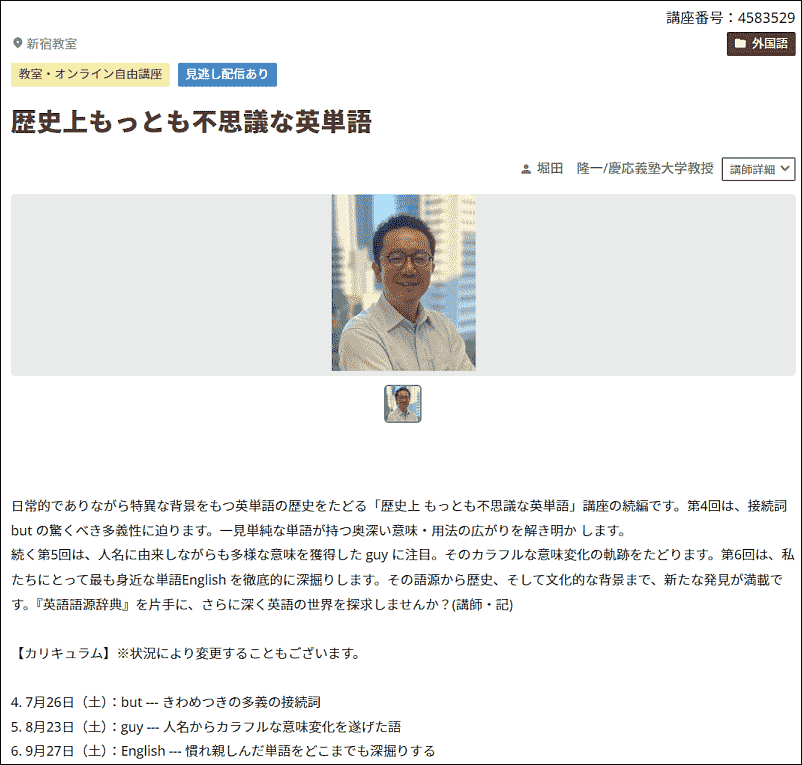
毎月1回,朝日カルチャーセンター新宿教室での英語史講座を開いています.今年度のシリーズは「歴史上もっとも不思議な英単語」です.英語史的に厚みと含蓄のある英単語を1つ選び,そこから説き起こして,『英語語源辞典』(研究社)や『英語語源ハンドブック』(研究社)等の参考図書の記述を参照しながら,その英単語の歴史,ひいては英語全体の歴史を語ります.
来週末の9月23日(土)の講座は夏期クールの3回目となります.今回は英語を学ぶ誰もが最も多く発したり聞いたりし,さらに読み書きもしてきた重要単語 English に注目します.この当たり前すぎる英単語をめぐる歴史は,実は英語史のおもしろさを煮詰めたような物語になっています.ふと立ち止まって考えてみると,謎に満ちた単語なのです.
・ なぜ「アングレ」(フランス語)や「エングリッシュ」(ドイツ語)ではなく英語では「イングリッシュ」なの?
・ English と綴って「イングリッシュ」というのはおかしいのでは?
・ England や Anglia との関係は?
・ なぜ Japanese の -ese や American の -n ではなく English には -ish の語尾がつくの?
・ なぜ米語は American ではなく,あくまで (American) English と呼ばれるの?
・ 言語名は通常は固有名詞かつ単数として扱われるのに,なぜ最近 Englishes という複数形が使われているの?
民族,国,言語,文化,歴史に関わる重要単語なので,このように疑問が尽きないのです.講座では,他の民族を表わす単語などとも比較しながら,English に込められた謎に迫ります.
講座への参加方法は新宿教室での直接受講,オンライン参加のいずれかをお選びいただけます.さらに2週間の見逃し配信サービスもあります.皆さんのご都合のよい方法でご参加いただければ幸いです.申込みの詳細は朝カルの公式ページよりご確認ください.
なお,この講座の見どころについては heldio で「#1574. "English" という英単語について思いをめぐらせたことはありますか? --- 9月27日の朝カル講座」としてお話ししています.こちらもあわせてお聴きいただければ幸いです.
</p><p align="center"><iframe src=https://voicy.jp/embed/channel/1950/7099532 width="618" height="347" frameborder=0 scrolling=yes style=overflow:hidden></iframe></p><p>
・ 寺澤 芳雄(編集主幹) 『英語語源辞典』新装版 研究社,2024年.
・ 唐澤 一友・小塚 良孝・堀田 隆一(著),福田 一貴・小河 舜(校閲協力) 『英語語源ハンドブック』 研究社,2025年.
2025-09-16 Tue
■ #5986. khelf 大学院生の研究テーマ一覧 --- khelf ゼミ合宿@茂原 [hel_education][khelf][seminar][sotsuron][helkatsu]
慶應義塾大学文学部英米文学専攻の堀田ゼミでは,9月16日(月)から18日(水)にかけて千葉県茂原市の宿にて2泊3日のゼミ合宿を実施しています.参加した大学院生,学部4年生,学部3年生,そして特別ゲスト講師(?)として菊地翔太先生(専修大学)を合わせた29名での研究発表合宿です.各々の個人研究のテーマを短時間で紹介・発表する「ポスターなしポスターセッション」の課題をこなします.
初日の昨日,そして2日目の今日の午前中で,まず大学院生7名による研究発表が行なわれました.
1. 中英語期の韻文作品における複合数詞の選択とその要因
2. 英語における What's X is X 表現の使用と発達,およびその理論的示唆
3. 古英語から初期中英語にかけての等位接続詞の導く節の語順変化
4. William Cecil, Lord Burghley の自筆草稿と印刷本における語源的綴字の比較
5. 動詞の自動詞化をともなう prepositional verbs の発達
6. 「妨げる」の意をもつ動詞の性質比較
7. 可算・不可算の区別はなぜあるのか?
いずれも今後どのように展開していくのかが楽しみな研究です.
2025-09-07 Sun
■ #5977. 2025年度の朝カルシリーズ講座の第5回「guy --- 人名からカラフルな意味変化を遂げた語」をマインドマップ化してみました [asacul][mindmap][notice][kdee][hee][etymology][hel_education][link][personal_pronoun][eponym][grammaticalisation][semantic_change]
8月23日(土)に,今年度の朝日カルチャーセンターのシリーズ講座「歴史上もっとも不思議な英単語」の第5回(夏期クールとしては第2回)となる「guy --- 人名からカラフルな意味変化を遂げた語」が,新宿教室にて開講されました.
講座と関連して,事前に Voicy heldio にて「#1539. 8月23日の朝カル講座 --- guy で味わう英語史」を配信しました.
この第5回講座の内容を markmap によりマインドマップ化して整理しました(画像をクリックして拡大).復習用にご参照ください.
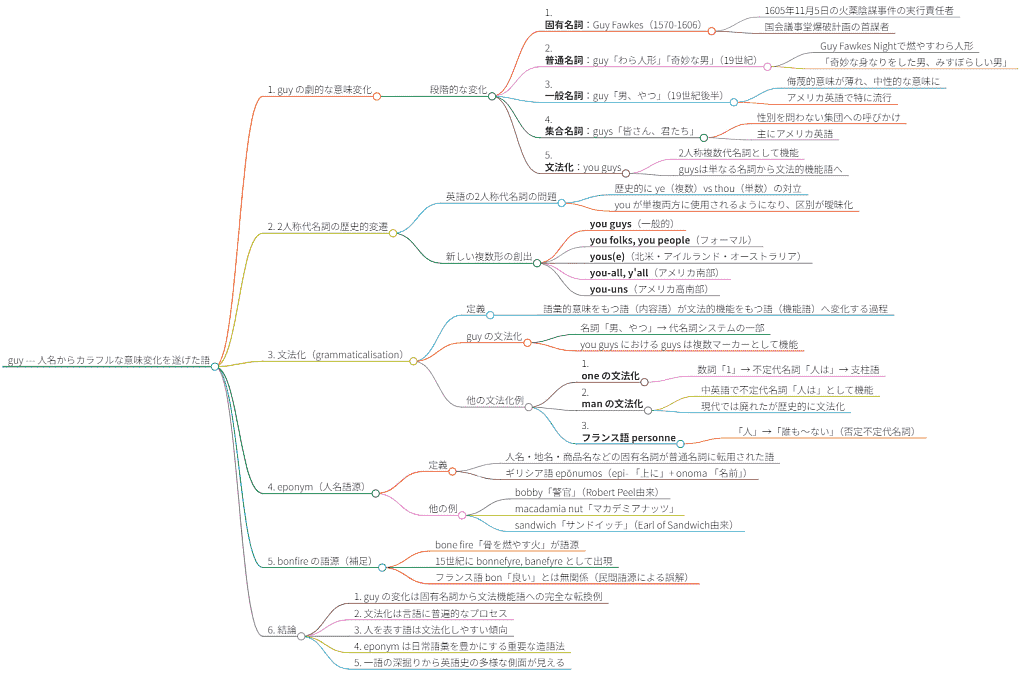
なお,この朝カル講座のシリーズの第1回から第3回についてもマインドマップを作成しています.
・ 「#5857. 2025年度の朝カルシリーズ講座の第1回「she --- 語源論争の絶えない代名詞」をマインドマップ化してみました」 ([2025-05-10-1])
・ 「#5887. 2025年度の朝カルシリーズ講座の第2回「through --- あまりに多様な綴字をもつ語」をマインドマップ化してみました」 ([2025-06-09-1])
・ 「#5915. 2025年度の朝カルシリーズ講座の第3回「autumn --- 類義語に揉み続けられてきた季節語」をマインドマップ化してみました」 ([2025-07-07-1])
・ 「#5949. 2025年度の朝カルシリーズ講座の第4回「but --- きわめつきの多義の接続詞」をマインドマップ化してみました」 ([2025-08-10-1])
シリーズの次回,第6回は,9月27日(土)に「English --- 慣れ親しんだ単語をどこまでも深掘りする」と題して開講されます.ご関心のある方は,ぜひ朝日カルチャーセンター新宿教室の公式HPより詳細をご確認の上,お申し込みいただければ.
2025-08-28 Thu
■ #5967. YouTube 「文藝春秋PLUS」にて英語史の魅力を語る Part 2(後編) --- なぜ英語には同音異義語が多いの? [notice][youtube][helkatsu][hel_education][sobokunagimon][synonym][loan_word][lexical_stratification][ame_bre]
昨日の記事 ([2025-08-27-1]) に引き続き,1週間前の8月21日(木)にオンエアとなった YouTube 「文藝春秋PLUS 公式チャンネル」の英語史トーク動画の後編をご紹介します.前編に続いて,近藤さや香アナの抜群の間合いに乗せられつつ,重要な「英語に関する素朴な疑問」を取り上げてお話ししています.
後編は「【flower(花)と flour(小麦粉)は同じ語源!】help, aid, assistance…「助け」の類義語は何が違う?|同音異義語が多いのはなぜか|「イギリス英語は保守的」は本当か?」と題する36分ほどのトークです.以下,後編で取り上げた話題と分秒リストを示します.
(1) 00:00 --- オープニング
(2) 01:00 --- なぜ英語には類義語が多いのか
(3) 12:31 --- なぜ英語には同音異義語が多いのか
(4) 14:33 --- 同音異義語の成り立ち
(5) 24:58 --- アメリカに渡って英語はどう変わったのか?
(6) 31:54 --- 英語はこれから多様化していくのか?
英語という言語を,これまでとは異なる角度から見直すきっかけとなればと思います.ぜひ YouTube のコメント欄から,ご感想等をいただければ.英語史をお茶の間に!
2025-08-27 Wed
■ #5966. YouTube 「文藝春秋PLUS」にて英語史の魅力を語る Part 2(前編) --- なぜ3単現の -s を付けるの? [notice][youtube][helkatsu][hel_education][sobokunagimon][verb][suppletion][3ps][personal_pronoun]
3ヶ月ほど前のことになりますが,5月30日(金)に YouTube 「文藝春秋PLUS 公式チャンネル」にて,前後編の2回にわたり「英語に関する素朴な疑問」に答えながら英語史を導入するトークが公開されました.フリーアナウンサーの近藤さや香さんとともに,計60分ほどお話をしています.とりわけその前編は,驚くほど多くの方々に視聴していただき,本日付けで視聴回数が10万回を超えています.
文藝春秋PLUSの制作班の方々も私自身も,予想外のことに驚きつつも,たいへん嬉しく受け取り,早速第2弾の企画が立ち上がりました.第2弾を8月初旬に収録した後,8月21日(木)の7時にその前編が,20時に後編がそれぞれオンエアされました.
上掲のサムネイルは,その第2弾の前編となります.「【英語の謎 go の過去形はなぜ went なのか】古英語時代は -ed よりも不規則動詞がデフォルト|なぜ「あなた」も「あなたたち」も you で表すのか|He likes…三単現にはなぜ s を付ける」と題して,27分ほどお話ししました.以下に話題と分秒リストを掲載します.
(1) 00:00 --- オープニング
(2) 02:25 --- なぜ不規則な動詞活用があるのか
(3) 13:51 --- なぜ you は単数形でも複数形でもあるのか
(4) 20:15 --- なぜ三単現に「-s」をつけるのか
(5) 25:23 --- 次回予告
第1弾に引き続き,「英語に関する素朴な疑問」 (sobokunagimon) を英語史の観点から説明するという趣旨のトークとなっています.ぜひ英語史の魅力を感じていただければ.
2025-08-24 Sun
■ #5963. 夏スク「英語史」初日の千本ノック(後編) [senbonknock][sobokunagimon][voicy][hel_education][notice]
先日の「#5960. 夏スク「英語史」初日の千本ノック(前編)」 ([2025-08-21-1]) に続き,8月20日の11:30より heldio 生配信した「千本ノック」 (senbonknock) の後編をアーカイヴとしてお届けします.後編は32分ほどで,7つの素朴な疑問が取り上げられました.以下に,本編(第2チャプター)で取り上げられた質問と本編チャプター内での対応する分秒を一覧します.
(1) 00:00 --- 英単語のアクセントは必ず守らないと通じないのか?
(2) 05:02 --- なぜドイツ語の Krankenhaus のように単純な単語を組み合わせず,英語は hospital のような全く異なる単語を使うのか?
(3) 08:07 --- なぜ no の後に来る名詞は単数になったり複数になったりするのか?
(4) 12:15 --- なぜ同じ綴りでも発音が違う単語があるのか?
(5) 16:12 --- 「エモい」や「チルい」のような英日ミックスの形容詞は昔からあったのか?
(6) 22:26 --- なぜ英語の文型は SVO (主語ー動詞ー目的語)なのか?
(7) 26:34 --- なぜ w はフランス語では「ドゥブルヴェ」なのに,英語では「ダブリュー」なのか?
素朴な疑問を寄せてくださった夏期スクーリング履修者のバックグラウンドは様々です.それだけに実に多種多様な疑問が寄せられてきて,実にワクワクしました.1つひとつがもっとじっくりと向き合いたいと思わせる問題ですし,実際に英語史の観点から深く論じるに足るトピックばかりです.「千本ノック」はやはり楽しいですね.
夏スクも残すところ今日と明日のみとなりました.残暑が強烈ですが,もう一息,頑張りましょう!.
2025-08-21 Thu
■ #5960. 夏スク「英語史」初日の千本ノック(前編) [senbonknock][sobokunagimon][voicy][hel_education][notice]
昨日の記事「#5959. 2025年度の夏期スクーリング「英語史」講義が始まります」 ([2025-08-20-1]) でお知らせしたように,英語史の集中講義が始まっています.昨日の講義では履修されている皆さんから「英語に関する素朴な疑問」を集め,講義後に11:30より即興で「千本ノック」 (senbonknock) の heldio 生配信を行ないました.60分超の長丁場となりましたが,立ち会っていただいた履修者の皆さん,そして急の生配信ながらもライヴでお聴き頂いたリスナーの皆さん,ありがとうございました.
生配信の様子は音声収録しておいたので,今朝の Voicy heldio にて配信しました.長尺なので前編(本日配信)と後編(後日配信)の2回に分けてお聴きいただきますが,まずは34分ほどの前編をお届けします.以下に,本編(第2チャプター)で取り上げられた質問と本編チャプター内での対応する分秒を一覧します.
(1) 01:25 --- アルファベットの起源は何か?
(2) 09:13 --- なぜ定冠詞と不定冠詞は難しいのか?
(3) 14:30 --- なぜ a は単体だと「エイ」と読むのに,単語としては「ア」と読むのか?
(4) 16:08 --- なぜ英語発祥の地であるロンドンの英語が,必ずしも標準的ではないのか?
(5) 20:28 --- なぜ英語には多くの時制があるのか?
(6) 24:36 --- なぜ発音しない文字(黙字)が入っている単語があるのか?
(7) 26:27--- 文法は現在も変化しているのか?
(8) 29:30 --- なぜ do の過去形は did なのか?
英語史の学び始めの景気づけとして「千本ノック」をやってみましたが,いかがでしたでしょうか.英語史への関心が湧いてきましたでしょうか.残暑厳しい折ですが,6日間の夏スク英語史を駆け抜けていきたいと思います.
2025-08-20 Wed
■ #5959. 2025年度の夏期スクーリング「英語史」講義が始まります [hel_education][hellog][heldio][hellog_entry_set][link][helkatsu][notice][khelf][inohota][hel_herald]
本日,慶應義塾大学通信教育課程の夏期スクーリング科目「英語史」が開講されます.来週の月曜日までの6日間にわたる集中講義です.
本日の初回講義では,本ブログの記事を組み合わせながら英語史の世界への導入を図ります.履修生の皆さんは,いつでもこちらの記事に戻ってきてください.また,この記事と同趣旨で「英語史夏期スクーリング 2025」という見やすい特設HPも用意しましたので,そちらもお気に入り等に登録してご参照ください.
1. イントロ
1.1. 不定冠詞 a と an について: 「#831. Why "an apple"?」 ([2011-08-06-1]),heldio 「#1. なぜ A pen なのに AN apple なの?」
1.2. 「英語史」講義担当者の紹介: note 「堀田隆一のプロフィール」,heldio 「#1171. 自己紹介 --- 英語史研究者の堀田隆一です」,「#2. 自己紹介」 ([2009-05-01-2])
2. 英語史の世界へようこそ
2.1. 英語史の魅力4点: 「#4546. 新学期の始まりに,英語史の学び方」 ([2021-10-07-1])
(1) 英語の見方が180度変わる
(2) 英語と歴史(社会科)がミックスした不思議な感覚の科目
(3) 素朴な疑問こそがおもしろい
(4) 現代英語に戻ってくる英語史
2.2. 「#4361. 英語史は「英語の歴史」というよりも「英語と歴史」」 ([2021-04-05-1]): 魅力 (2) に通じます
2.3. 「なぜ英語史を学ぶのか」の記事セット: 様々な角度から「なぜ学ぶのか」を検討してみました(cf. heldio 「#444. 英語史を学ぶとこんなに良いことがある!」や heldio 「#112. 英語史って何のため?」でも取り上げています)
3. 英語に関する素朴な疑問
3.1. 「#1093. 英語に関する素朴な疑問を募集」 ([2012-04-24-1]): 魅力 (3) に通じます
3.2. 3166件の素朴な疑問
3.3. これまで hellog で取り上げてきた素朴な疑問集
3.4. 知識共有サービス「Mond」で英語・言語に関する素朴な疑問に回答しています
4. 英語史を日常の風景に
4.1. 「#5097. hellog の読み方(2023年度版)」 ([2023-04-11-1]): 2009年5月1日より毎日更新している英語史のブログです.この hellog の効果的な使い方の tips をどうぞ.合わせて「#5728. 2024年 hellog でよく読まれた記事ベスト50」 ([2025-01-01-1]) もご覧ください.
4.2. 音声コンテンツ一覧 (heldio & hellog-radio): hellog の音声版というべき Voicy 「英語の語源が身につくラジオ」 (heldio) .2021年6月2日より毎朝6時に1本10--20分ほどで英語史の話題をお届けしています.日々の英語史の学びのためにフォローしてください.英語史の話題が日常になります.「#5093. heldio の聴き方(2023年度版)」 ([2023-04-07-1]),「#5727. 2024年 heldio 配信でよく聴かれた回ベスト30」 ([2024-12-31-1]),「#5098. 英語史を学び始めようと思っている方へ hellog と heldio のお薦め回一覧(2023年度版)」 ([2023-04-12-1]),「#5921. リスナー投票による heldio 2025年第2四半期のランキング」 ([2025-07-13-1]) も参照.
4.3. 「#5091. khelf の沿革,活動実績,ミッションステートメント」 ([2023-04-05-1]): khelf HP,公式 X アカウント @khelf_keio,公式 Instagram アカウント @khelf_keio より情報を発信しています.
4.4. 「#5917. 『英語史新聞』第12号が公開されました」 ([2025-07-09-1]): 世界初の英語史を主題とする新聞の第12号です.
4.5. khelf イベント2025年度版「英語史コンテンツ50」が展開中です: 今年6月20日より休日を除く毎日,英語史を専攻する通学課程のゼミ生・院生,通信課程の卒業生を中心とする khelf メンバーから手軽に読める「英語史コンテンツ」がウェブ上にアップされてきます.上記だけでは足りないという方は,過年度の同企画もどうぞ.
4.6. 「いのほた言語学チャンネル」(旧「井上逸兵・堀田隆一英語学言語学チャンネル」): 2022年2月26日より同専攻の井上逸兵先生(英語学・言語学)と一緒に週2回(水)と(日)の午後6時に動画を公開しています
5. 講義の進め方
5.1. 講義スライド(パスワード付きPDF),テキスト,リアクションペーパー提出課題,試験,評価について
5.2. 指定テキストは拙著『英語の「なぜ?」に答えるはじめての英語史』(研究社,2016年).本書のコンパニオン・サイトもあります.
5.3. 英語史の読書案内:「#5830. 英語史概説書等の書誌(2025度版)」 ([2025-04-13-1]),「#4557. 「英語史への招待:入門書10選」」 ([2021-10-18-1]),heldio 「対談 英語史の入門書」
5.4. 過年度の「英語史」履修生の言葉: 「#5939. 2025年度前期,英語史の授業を通じて何を学びましたか?」 ([2025-07-31-1]),「#5393. 2023年度,1年間の「英語史」の講義を終えて」 ([2024-02-01-1]),heldio 「#974. 1年間の「英語史」の講義を終えて --- 2023年度版」
6. 履修生よりライヴで寄せられた英語の素朴な疑問に即興で答える「千本ノック」
以上,スクーリングの1週間,そしてその後も,知的興奮に満ちた英語史ライフをお楽しみください! 関連して「#5593. 2024年度の夏期スクーリング「英語史」講義が始まります」 ([2024-08-19-1]) もどうぞ.
なぜ英語史を学ぶのか.迷ったら,まず「#444. 英語史を学ぶとこんなに良いことがある!」を.
2025-08-18 Mon
■ #5957. 8月23日(土),朝カル講座の夏期クール第2回「guy --- 人名からカラフルな意味変化を遂げた語」が開講されます [asacul][notice][personal_pronoun][eponym][grammaticalisation][semantic_change][kdee][etymology][hel_education][helkatsu]

朝日カルチャーセンター新宿教室での英語史講座が続いています.月一のペースで進行中のこのシリーズでは,「歴史上もっとも不思議な英単語」というテーマを掲げています.歴史の厚みを感じさせる語彙を一語ずつじっくりと味わい,『英語語源辞典』(研究社)等の信頼できる資料を手がかりに,言葉の変遷がもたらす驚きと発見に迫っています.
今度の土曜日8月23日の講座は夏期クールの2回目を迎えます.一見すると平凡な guy という語に焦点を絞り,この小さな単語がたどってきた劇的な意味の軌跡をたどることから話を始めます.その流れから人称代名詞 (personal_pronoun) の話題,文法化 (grammaticalisation) の問題,そして固有名詞に由来するeponymの事例相まで,話題は自在に広がっていきます.1単語から見えてくる英語史のダイナミズムと言語変化の妙味を存分にお楽しみください.
参加方法は新宿教室での直接受講,オンライン参加のいずれかをお選びいただけます.さらに2週間の見逃し配信サービスもご用意しております.皆さんのご都合のよい方法でご参加ください.申込み詳細は朝カルの公式ページでご確認いただけます.
なお,この講座の見どころについては heldio で「#1539. 8月23日の朝カル講座 --- guy で味わう英語史」としてお話ししています.こちらもあわせてお聴きいただければ幸いです.
・ 寺澤 芳雄(編集主幹) 『英語語源辞典』新装版 研究社,2024年.
2025-08-10 Sun
■ #5949. 2025年度の朝カルシリーズ講座の第4回「but --- きわめつきの多義の接続詞」をマインドマップ化してみました [asacul][mindmap][notice][kdee][hee][etymology][hel_education][lexicology][but][conjunction][adverb][preposition][conversion][pragmatics][link]
7月26日(土)に,今年度の朝日カルチャーセンターのシリーズ講座「歴史上もっとも不思議な英単語」の第4回(夏期クールとしては第1回)となる「but --- きわめつきの多義の接続詞」が,新宿教室にて開講されました.
講座と関連して,事前に Voicy heldio にて「#1515. 7月26日の朝カル講座 --- 皆で but について考えてみませんか?」と「#1518. 現代英語の but,古英語の ac」を配信しました.
この第4回講座の内容を markmap というウェブツールによりマインドマップ化して整理しました(画像をクリックして拡大).復習用にご参照ください.
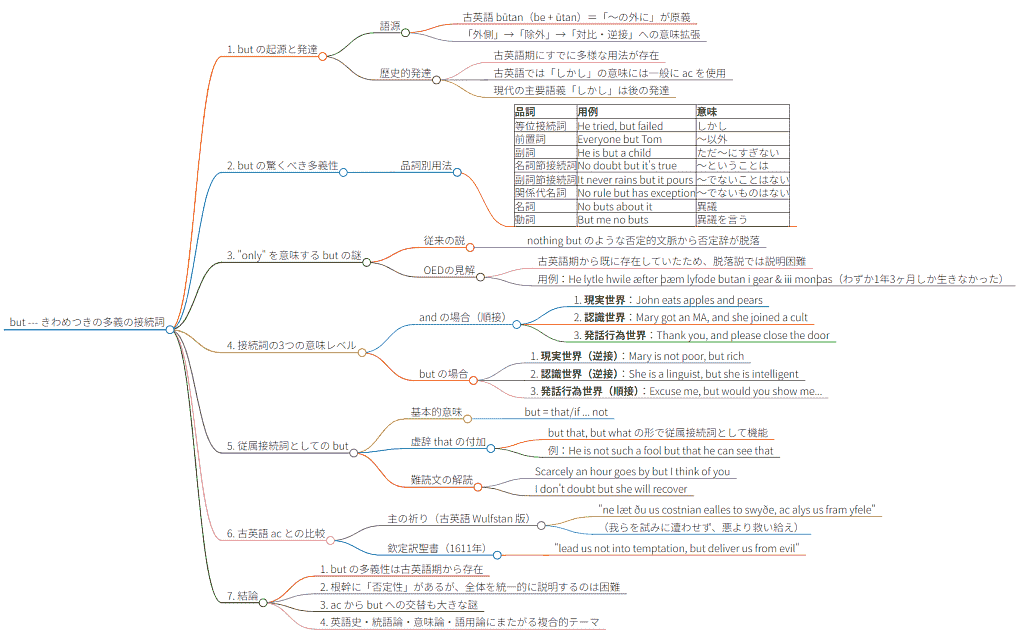
なお,この朝カル講座のシリーズの第1回から第3回についてもマインドマップを作成しています.
・ 「#5857. 2025年度の朝カルシリーズ講座の第1回「she --- 語源論争の絶えない代名詞」をマインドマップ化してみました」 ([2025-05-10-1])
・ 「#5887. 2025年度の朝カルシリーズ講座の第2回「through --- あまりに多様な綴字をもつ語」をマインドマップ化してみました」 ([2025-06-09-1])
・ 「#5915. 2025年度の朝カルシリーズ講座の第3回「autumn --- 類義語に揉み続けられてきた季節語」をマインドマップ化してみました」 ([2025-07-07-1])
シリーズの次回,第5回は,8月23日(土)に「guy --- 人名からカラフルな意味変化を遂げた語」と題して開講されます.ご関心のある方は,ぜひ朝日カルチャーセンター新宿教室の公式HPより詳細をご確認の上,お申し込みいただければ.
2025-07-31 Thu
■ #5939. 2025年度前期,英語史の授業を通じて何を学びましたか? [hel_education][sobokunagimon][voicy][heldio][khelf][inohota][inoueippei]
今年度の大学の前期も無事に終了.学期末に,英語史概説の講義について履修者から感想や意見を募った.多少の編集を加えつつ,匿名のままでコメントを紹介したい.
・ 言語の変化というものは,合理化・規則化されていったというだけの内面的な理由ではなく,その地域,その話者の文化・社会との関係性といった外面的な理由も探らなければ語ることはできないという,英語史の意議や深みを知ることができた
・ 「英語史」という学術領域がしっかりあるということに興味を持ってとった授業だったが,総じて学問としての面白さ,過去の歴史から現代を見つめ直す面白さを知れたと思う.その中で,初回の授業であった英語に対する純粋な疑問を受講生から集めて,それを解説する回は,学問に対する素直な姿勢と純粋な疑問から展開される学問の面白さを実感した.
・ 英語史の講義を通して,単なる英語の歴史を学んでいるのではなくて,「社会」のことも学べるという新たな視点を持つことができた.この新たな視点を持ってこれからの講義に臨みたいし,また新たな価値を創出したいと感じた.
・ 私は単語やつづりをおぼえるのがとても苦手で苦労している.しかし,その単語一つ一つに注目し,「これは,○○語由来かな」や「こういう経緯でこのつづりになったのかな」と考えを巡らせれば,英語学習もより楽しくなるのではないかと思った.歴史を学んだことで英語学習がよりおもしろくなると思う.
・ この学びにおいて,当初自分が現代英語の構成要素をかんちがいしていたように,今自分の回りにあるものに対しての認識のズレ,そしてそれを直そうとする中で新たな学びがあることが大切だと思いました.この授業をうけて,英語史だけでなく,自分の普段からの物の見方を変えてみようとまで思うことができました.
・ 言語というものが,それ単体としては成り立たず,社会と歴史と深く関わりがあることを証明するよい例であろう.言語を遡るという行為は人間の豊かな歴史的はぐくみを可視化させるものだと感じた.
・ 英語史や言語史もまた人が紡いできた歴史であるからこそ,画一的な物の見方や解釈を押しつけず,多面的に判断することを大切にしたいと思えたことが私にとって何よりの価値であった.
・ 私は最初「英語史」と聞いて身構えていた.しかし,英語を学習し始めたころから抱いてきた疑問について,英語史を学ぶなかで解決していくことができた.学べば学ぶほどおもしろくなるのが,この英語史だと感じた.高校で世界史を選択していた私にとって,英語史は大好きな英語と世界史のミックスであり,毎回目からうろこの内容であった.世界史で学んだ人名たちが,こんなにも英語に影響を及ぼしていることは衝撃だった.
そして,最後にきわめつけの名コメントを挙げよう.
・ グリムの法則は飲み会ネタで使える.現代英語学の井上先生が言語学のトピックは飲み会で使えると言っていたが,確かにその通りだと思った.
ということで,井上逸兵さんとお届けしている YouTube 「いのほた言語学チャンネル」を,ぜひよろしくお願いします(笑)
先日,今回の記事と同趣旨で Voicy heldio にて履修者のコメントを紹介した.本記事と合わせて,ぜひ「#1522. 「英語史」の講義を終えて --- 2025年度前期版」をお聴きいただければ.
2025-07-22 Tue
■ #5930. 7月26日(土),朝カル講座の夏期クール第1回「but --- きわめつきの多義の接続詞」が開講されます [asacul][notice][conjunction][preposition][adverb][polysemy][semantics][pragmatics][syntax][negative][negation][hee][kdee][etymology][hel_education][helkatsu][link]

今年度朝日カルチャーセンター新宿教室にて,英語史のシリーズ講座を月に一度の頻度で開講しています.今年度のシリーズのタイトルは「歴史上もっとも不思議な英単語」です.毎回1つ豊かな歴史と含蓄をもつ単語を取り上げ,『英語語源辞典』(研究社)や新刊書『英語語源ハンドブック』(研究社)などの文献を参照しながら,英語史の魅力に迫ります.
今週末7月26日(土)の回は,夏期クールの初回となります.機能語 but に注目する予定です.BUT,しかし,but だけの講座で90分も持つのでしょうか? まったく心配いりません.but にまつわる話題は,90分では語りきれないほど豊かです.論点を挙げ始めるとキリがないほどです.
・ but の起源と発達
・ but の多義性および様々な用法(等位接続詞,従属接続詞,前置詞,副詞,名詞,動詞)
・ "only" を意味する but の副詞用法の発達をめぐる謎
・ but の語用論
・ but と否定極性
・ but にまつわる数々の誤用(に関する議論)
・ but を特徴づける逆接性とは何か
・ but と他の接続詞との比較
but 「しかし」という語とじっくり向き合う機会など,人生のなかでそうそうありません.このまれな機会に,ぜひ一緒に考えてみませんか?
受講形式は,新宿教室での対面受講に加え,オンライン受講も選択可能です.また,2週間限定の見逃し配信もご利用できます.ご都合のよい方法で参加いただければ幸いです.講座の詳細・お申込みは朝カルのこちらのページよりどうぞ.皆様のエントリーを心よりお待ちしています.
(以下,後記:2025/07/23(Wed))
本講座の予告については heldio にて「#1515. 7月26日の朝カル講座 --- 皆で but について考えてみませんか?」としてお話ししています.ぜひそちらもお聴きください.
・ 寺澤 芳雄(編集主幹) 『英語語源辞典』新装版 研究社,2024年.
・ 唐澤 一友・小塚 良孝・堀田 隆一(著),福田 一貴・小河 舜(校閲協力) 『英語語源ハンドブック』 研究社,2025年.
Powered by WinChalow1.0rc4 based on chalow